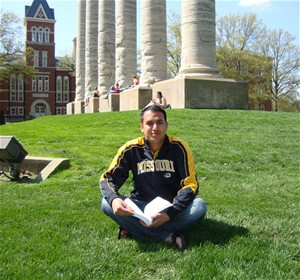
Abdullah Jan and his wife Shabnam (not pictured) are Fulbright students at the University of Missouri. After graduation, the couple will return to Kabul to work in the transportation engineering field.
USAID/AIRP
Two interns at the USAID-sponsored Kabul Central Materials Laboratory pursue engineering degrees in the U.S.
“You must use every available opportunity. Be persistent, don’t be afraid to innovate, be honest and dependable, and take responsibility for what you do.”—Abdullah Jan and Shabnam
6 JUNE 2010 | KABUL, AFGHANISTAN
When Abdullah Jan met Shabnam, they were seniors in the Engineering Department at Kabul University. They soon began to intern at the Kabul Central Materials Laboratory operated by USAID’s Afghanistan Infrastructure Rehabilitation Program (AIRP).
A year and a half later, Abdullah and Shabnam were on their way to study in the United States as Fulbright scholarship recipients. Their experience at the Kabul Central Materials Laboratory convinced them that they could contribute to Afghanistan’s transition to a stable and economically sustainable society. “I have received other internships,” Abdullah said, “but I think that the internships that AIRP provides to Afghan students are the most effective ones.”
In the United States, the now-married couple is enrolled in the Transportation Engineering Master’s Program at the University of Missouri. Both have 4.0 GPAs, the highest score students can achieve. After they complete their degrees, they will return to Kabul University as assistant professors.
The experience at the University of Missouri is providing Abdullah and Shabnam with top quality course work and is widening their horizons as future teachers and administrators. “Through professional courses and activities, I am learning everything about the university, including communications, administrative systems, and the behavior of professors,” said Abdullah.
The more Abdullah and Shabnam learn, the more they are convinced that they can help Afghanistan to succeed. “You must use every available opportunity,” they said. “Be persistent, don’t be afraid to innovate, be honest and dependable, and take responsibility for what you do.”
When they return to Afghanistan, one of their first plans is to start a branch of the Institute of Transportation Engineers to support safe and efficient traffic operations and other transportation-related services in Kabul. “Anyone who wants to be a successful engineer should never stop learning,” Abdullah said. “I am really optimistic about the future of Afghanistan.”







Comment
Make a general inquiry or suggest an improvement.